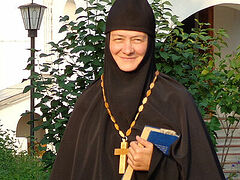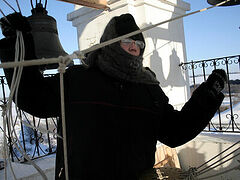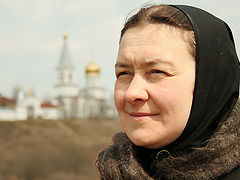 Igumen Savvaty (Rudakov) and Schemanun Georgia (Litvina)
Igumen Savvaty (Rudakov) and Schemanun Georgia (Litvina)
Igumen Savvaty (Rudakov), builder and spiritual father of the monastery:
“I felt insignificant and unworthy next to her”
Matushka Georgia used to come to the monastery as a pilgrim for many years. During one of these trips, she told me:
“I’m coming to live with you.”
I smiled inside. Mother didn’t ask permission, but simply declared her decision. I thought: “Another old lady from the world. She wants to come to the monastery, but she doesn’t suspect how difficult it is here. She’ll stay for a bit then leave.” I said:
“Okay, as God grants.”
“Batiushka, come then and get me. I’ve already packed my clothes.”
And I felt like I couldn’t say no—she spoke with authority. I went to Lysva to get her myself. I decided: “Let this old grandma live in our monastery.”
Along the way, she told me about the people she loved. She told me about the famous ascetic and man of prayer, Schema-Archimandrite Vitaly (Sidorenko; 1928-1992), and how he went to Lysva several times and in 1989 tonsured her into monasticism.
She also told me about Metropolitan Nikon (Vasin) of Lipetsk and Zadonsk (now a retired Schema-Metropolitan), abbot of the Zadonsk Nativity of the Theotokos Monastery, how she talked with him at Zadonsk Monastery, and how she was tonsured into the schema in 2014 with his blessing.
I listened to her stories and my opinion about her changed dramatically. I realized what a gift the Lord had sent our monastery. It wasn’t some regular old lady from the world I was traveling with, but a woman of God. Tears began pouring from my eyes. I was imbued with the spirit of her purity, simplicity, and righteousness. I unloaded her belongings in the monastery with reverence.
Schemanun Georgia (Litvin) led a concentrated inner life. When she prayed for people who asked for her prayerful help, the Lord revealed their lives to her. She sorrowed over human infirmities, and then everything was set aright. The Lord gave her the gift of clairvoyance.
She was always in a calm, good-natured mood; she never grumbled about any offenses, illnesses, or sorrows. This gentleness, this constant good humor, abiding in the spirit of God, in joy—these are signs of holiness.
Human sorrows broke on her goodness, on her loving heart. Her peaceful dispensation was passed on to others. Just as someone could talk with Elder John (Krestiankin) and leave him a different man—doubts vanished, sorrows subsided, hope appeared—so her peaceful spirit filled everyone who spoke with her. It’s not for nothing that the proverb says: “A man is known by the company he keeps.” And the Psalter says:
With the holy thou wilt be holy; and with the innocent man thou wilt be innocent. And with the excellent man thou wilt be excellent; and with the perverse thou wilt shew forwardness (Ps. 17:25-26).
In Eldress Georgia, you could feel the school of Fr. Vitaly (Sidorenko), an ascetic of piety of our times. Fr. Vitaly was very humble and meek and had spiritual courage, gift of tears, and chastity; he was a confessor—all this could be felt in her too.
From just one glance at Schemanun Georgia, after just twenty minutes I realized that this was a person of holy life. It just had to be felt. Just an inconspicuous old woman sitting there, then you start talking to her, and what warmth comes from her. I felt so insignificant, so small, unworthy, sinful next to her—darkness contrasted with light. I felt my unworthiness. And all her gifts were the fruit of prayer—she prayed constantly, never letting her prayer rope out of her hand.
At the end of her life, Eldress Georgia got cancer. She suffered greatly, but endured everything patiently and courageously. She didn’t complain about her severe cancer, but simply faded away. She was in pain. Even the doctors were amazed at how she endured all of it and kept going to church and praying. She never weakened in the Jesus Prayer until the end of her days.
I cherish her mantia and skufia as relics.
Schemanun Georgia was short of stature. But when we met, I felt like it was me who was small and her a giant—a giant of spirit. I always felt Paschal joy when talking with her.
 The sisters of the Kazan-Tryphon Convent with the clergy
The sisters of the Kazan-Tryphon Convent with the clergy
Elena Troshina: My friendship with the Eldress
I met Eldress Georgia two years before her death, in 2016, at the All Saints Church of the Kazan-St. Tryphon Hermitage in Verkhnechuskovkie Gorodki, where she had the obedience of reading the Psalter.
I went up to the Eldress and asked for her prayers. She said she would certainly pray and invited me to visit her cell. When I went to see her after an expedition, I found out that she was the spiritual child of Schema-Archimandrite Vitaly (Sidorenko), whom I greatly revere. His letters, prayer rope, some personal items, and a cross he had cut out of a tin can were lying on the table. Mother Georgia talked about how Fr. Vitaly came to Lysva for treatment three times and tonsured her and several other faithful women as nuns. She also told us about his letters and spiritual instructions.
So, having briefly told me about her life, she gave me 200 rubles and a candle and asked:
“When you go to Georgia, submit some lists for commemoration at the grave of Fr. Vitaly and light a candle for me.”
Here I was quite puzzled! This was the first time she’d ever seen me—how did she know that I revere Fr. Vitaly and go on pilgrimages to Georgia?! She said it all quite matter-of-factly, as though she had known me for many years.
I did everything the Eldress asked, and when I returned from Georgia, I brought her some holy items from the grave of her spiritual father. And that’s how we became friends.
 Schemanun Georgia and Elena Troshina
Schemanun Georgia and Elena Troshina
The schemanun’s life story
The schemanun’s life was hard; her spirit was forged in heavy sorrows and trials. Schemanun Georgia (Valentina Vasilievna Litvina in the world) was born into a peasant family in Tokarevka village in the Molotov Province (now the Perm Region) in 1932.
Her father, Vasily Mikhailovich Litvin, and mother, Natalia Petrovna, were born in 1898 and 1900 respectively. They lived separately, and didn’t join the collective farm. They had horses, cows, pigs, and poultry. They didn’t make friends with the collective farmers, and the collective farmers didn’t care for them either.
One of her uncles, Yakov Mikhalovich Litvin, was a resident of the Belogorsk Monastery—thirty-four monks of which were tortured and shot by the Bolsheviks—and the abbot, Archimandrite Varlaam (Konoplyov), was drowned in the Kama. Nothing is known about the fate of Yakov Mikhailovich. Apparently, he was among those killed.
In the Litvin family, Valentina was the third and last child of those who survived. Her mother Natalia gave birth fourteen times at home. There was neither time nor the opportunity to make it to the hospital, and many of her children died at birth or shortly after.
Valya’s older brother, Alexander, was industrious. He fished and trapped rabbits from an early age. The meat was a good support for the family. He would prepare skins and give them to collectors in exchange for food or fabric, mainly calico, which their mother used to sew dresses for herself and her daughters, and shirts for the men.
The second in the family was her sister Alexandra, or Sanka as her father called her, born in 1928. From the age of four, she became a full-time nanny for her younger sister Valya, who was born in 1932. Putting her to sleep, feeding her, swaddling her—young Sanka had to take care of all of this, so her education ended with second grade. From the age of five, she also spun wool and flax. Their mother would weave fabric out of them and make bags for the family and for sale. She also made straps from flax that were then used to tie up bast shoes. They also made bast shoes themselves, and not only for themselves, but also for sale.
When Valentina grew up, she took over for her older sister in all these labors, and her sister went with her father and brother to cut hay in the autumn for hire. They sawed and chopped wood. When they were building their own house, Valentina helped the men skin the logs and daub the walls. In 1948, Alexandra got married and eventually had five children. Valentina always helped raise her nephews and introduced them to the faith.
Soon began the oppression of the private farmers in the village. The authorities tried to drive everyone into the collective farms, threatening otherwise to take away their livestock. And in 1936, when Valechka was four years old, her father gathered up their belongings, sold off all their animals, and moved the family to Lsyva. They rented housing in the city for a long time, moving into their own house only in 1939, and even then not all at once. First, they built a banya [bathouse], and they lived there for a time while their cabin was being finished.
In July 1941, Valya’s older brother was sent to the front. He managed to write a single letter from the road, and in November they served his funeral: “Alexander Vasilievich Litvin, born 1921, died September 15, 1941, in the battles near Vinnitsa.” He was only twenty years old. May the soldier Alexander inherit the Kingdom of Heaven!
At the end of 1941, a military plant was evacuated from Odessa to Lysva. Sanka immediately started working there, and her 43-year-old father worked there too. He wasn't conscripted to the front—he was given an exemption because he was valued as a good worker. The work was difficult and the workshops were hastily made from planks, so their hands would freeze to the metal in winter. The workshop where she worked was jokingly called the “kindergarten” because boys and girls as young as thirteen worked there.
Food cards were introduced in the city and throughout the country at the beginning of the war. There were cards for meat, cereal, fats, and bread, which were distributed to workers, children, and dependents. Workers were given seventeen ounces of meat, twenty-one ounces of grains, and fourteen ounces of margarine per month. With a bread card, you could get twenty-one ounces of bread per day. It was the same for children and dependents.
During holidays or for exceeding the rations, diluted alcohol was given out. The alcohol could be exchanged for money or bread with the wounded from the hospital, sometimes for vouchers. Sanka usually took money, bought oat flour from the collective farm workers in the market, cooked a porridge-like soup from it at home, and fed her younger sister, who was blue from hunger.
In 1944, trouble came to the house. Their mother, Natalia, was sick all winter, wasting away in front of their eyes. Numerous births, the wartime famine, and her backbreaking daily labor had all taken their toll. On the fourth of June, she quietly died in her sleep. She was forty-four and she died in 1944. Their father took a day off of work, covered his wife with a blanket, and went to his eldest daughter, who had been working with other factory workers harvesting firewood for more than a month. Twelve-year-old Valya was left alone in the house with her dead mother. She curled up in the far corner of her bed, buried herself in her fur coat, and cried bitterly out of pity and fear. They buried her mother in a mass grave.
In 1946, when Valya turned fourteen, her school life came to an end, after finishing just six grades, and she went to work. She worked as a babysitter for a year then went to the factory, where she worked in the warehouse for seven years. Then she got a nursing job in a hospital, where she worked for the rest of her life until retirement.
That same year, her life path led her to the Church. As Valentina herself said, in the spring, sitting in a class, she looked out the window, watching the children playing on the street. Questions suddenly popped up in her mind: Why do people die? What happens to them after death? No one could answer in a way that completely satisfied her childlike curiosity. Then her neighbor took her to a church where the priest was able to answer her questions.
 At the Church of the Apostle and Evangelist John the Theologian, Lysva
At the Church of the Apostle and Evangelist John the Theologian, Lysva
Thus, from the age of fourteen began her service to God. Valya became a regular parishioner of the Church of the Apostle and Evangelist John the Theologian in Lysva. She rushed to spend every free minute there. In those years, people were expelled from the Party and removed from leadership positions for having faith, but Valentine had nothing to fear. She wasn’t a member of the Party and held no high positions. And her bosses turned a blind eye to her “eccentricities,” as they considered them. But in fact, faith had become the meaning of life for her. There were many people who wanted to baptize their children and get married in the Church in those days. It wasn’t always safe in church, so Valentina’s little house turned into a place where the Sacraments of Baptism and Marriage were often celebrated with the strictest secrecy.
Valentina didn’t get married, but lived in chastity and prayer. She would spend her vacations going on pilgrimage, praying in the churches and monasteries of Kiev, Pskov, Zagorsk [Sergiev Posad], Krasnodar, and Latvia and Estonia. Archimandrite John (Krestiankin) took note of her at the Holy Dormition-Pskov Caves Monastery and foretold her future as a monastic. And the Elder’s prediction came true. Valentina became a spiritual child of Schema-Archimandrite Vitaly (Sidorenko), who tonsured her into monasticism in 1989 when she was fifty-seven.
 Schema-Archimandrite Vitaly in Lsyva
Schema-Archimandrite Vitaly in Lsyva
At the beginning of the 1990s, Valentina exchanged her hut for a room in a veterans’ home. Due to her age and health, it was getting hard for her to cut firewood and heat the stove. Plus, as a child she had had a serious problem with her lungs.
Despite her frail health, she lived a long life, full of spiritual labors and asceticism. The Eldress spent the last years of her life in our monastery, the Kazan-St. Tryphon Hermitage in Verkhnechusovskie Gorodki. The Eldress reposed in April 2018 and was buried in our monastery cemetery.
This is the life story of one of the sisters of our monastery.








